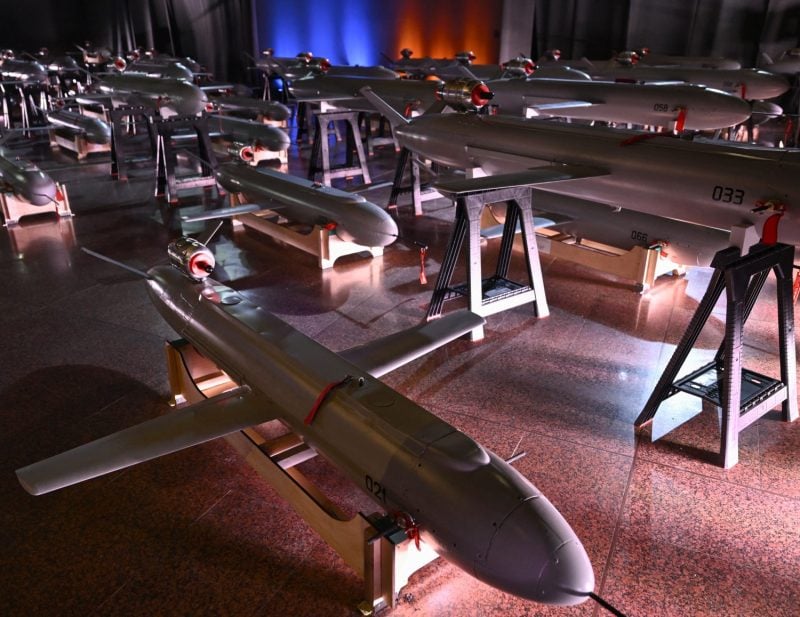Trump Doubles Steel and Aluminum Tariffs to 50 Percent

Trump Doubles Steel and Aluminum Tariffs to 50 Percent
Economists warn that such duties will hike consumer prices and lower U.S. economic output.
Coils of steel are seen in a yard outside one of ArcelorMittal Dofasco’s steel manufacturing buildings in the Canadian province of Ontario on June 4. Cole Burston/AFP via Getty Images
Welcome back to World Brief, where we’re looking at increased U.S. steel and aluminum tariffs, the Gaza Humanitarian Foundation pausing aid, and Iran rejecting a new U.S. nuclear proposal.
Doubling the Rate
U.S. President Donald Trump’s increased steel and aluminum tariffs went into effect on Wednesday. At 50 percent, they’re double the 25 percent duties that were first imposed in March. “In my judgment, the increased tariffs will more effectively counter foreign countries that continue to offload low-priced, excess steel and aluminum in the United States,” Trump said on Tuesday.
Welcome back to World Brief, where we’re looking at increased U.S. steel and aluminum tariffs, the Gaza Humanitarian Foundation pausing aid, and Iran rejecting a new U.S. nuclear proposal.
Doubling the Rate
U.S. President Donald Trump’s increased steel and aluminum tariffs went into effect on Wednesday. At 50 percent, they’re double the 25 percent duties that were first imposed in March. “In my judgment, the increased tariffs will more effectively counter foreign countries that continue to offload low-priced, excess steel and aluminum in the United States,” Trump said on Tuesday.
However, economists warn that such increases will raise prices for consumers and significantly lower U.S. economic output. According to a new Congressional Budget Office report published on Wednesday, U.S. tariff increases in place before May 13 are expected to reduce the federal deficit by $2.8 trillion, after adjusting for growth and investment.
Regarding tariffs on metals specifically, steel prices have climbed 16 percent since Trump took office in January, according to the U.S. Producer Price Index. The U.S. Commerce Department calculated that the cost of steel in the United States is around $984 per metric ton, which is much higher than steel in Europe (at $690) or in China (at $392).
Trump’s decision to double steel and aluminum duties will affect most U.S. trading partners, but the United Kingdom remains an exception. U.S. levies on British metals will remain at 25 percent, according to the White House, though that rate could go up starting on July 9 if Washington believes that London has not held up its end of the new trade deal that the two reached last month.
British Prime Minister Keir Starmer expressed confidence on Wednesday that the United Kingdom will become entirely exempt from the U.S. metals tariffs before the July 9 deadline. “We are the only country in the world that isn’t paying the 50 percent tax on steel, and that will be coming down,” Starmer told British lawmakers. “We are working on it, to bring it down to zero. That is going to happen.”
The European Union also expressed optimism toward clinching a favorable trade deal with the United States. On Wednesday, European officials said that ongoing trade talks have advanced despite the latest tariff increases. “What makes me optimistic is I see the progress,” said Maros Sefcovic, the European commissioner for trade and economic security. “The discussions are now very concrete.”
The EU previously outlined a series of countermeasures in response to Trump’s initial steel and aluminum levies but has since delayed those actions until July 14 in an effort to ease negotiations. If trade talks collapse, though, the European Union has said it is ready to enact retaliatory measures.
Meanwhile, several U.S. trading partners have denounced Trump’s decision to raise steel and aluminum duties. Mexican Economy Secretary Marcelo Ebrard called the massive increase “unfair and unsustainable,” adding that he will head to Washington on Friday to negotiate a plan to exclude Mexico from the hike. Canadian Prime Minister Mark Carney said on Wednesday that intensive negotiations are continuing to prevent what he calls Trump’s “illegal” trade measures.
Today’s Most Read
- How Russia Responds to Ukraine’s Drone Attack Depends on Trump by John Haltiwanger
- Putin Is a Gambler, not a Grand Master by Anastasia Edel
- Trump’s Choice on Iran by Emma Ashford
What We’re Following
Halting aid. The Israeli- and U.S.-backed Gaza Humanitarian Foundation (GHF) refused to give out any aid on Wednesday, after dozens of Palestinians in Gaza were killed this week while trying to access food. Instead, the organization urged Israel to improve civilian safety beyond its distribution perimeters, asking the military to “guide foot traffic in a way that minimizes confusion or escalation risks,” develop clearer guidance for civilians, and enhance staff training to improve security.
“Our top priority remains ensuring the safety and dignity of civilians receiving aid,” a GHF spokesperson said. The group said its four sites would remain closed until June 5 to work on “organization and efficiency.”
More than 80 people have been killed and hundreds of others wounded near GHF distribution points in recent days, according to local health officials. Israel maintains that it does not target civilians, though it warned Palestinians against approaching GHF sites or adjacent roads, as they are considered “combat zones.”
The United Nations Security Council voted on a draft resolution on Wednesday calling for “an immediate, unconditional and permanent ceasefire in Gaza respected by all parties” and the “immediate and unconditional lifting of all restrictions on the entry of humanitarian aid into Gaza and its safe and unhindered distribution at scale.” The United States vetoed the resolution, even as the U.N. continues to warn of a mounting famine in the territory.
No nuclear deal. On Wednesday, Iranian Supreme Leader Ayatollah Ali Khamenei rejected a U.S. proposal for a new nuclear deal, once again slashing hopes that an agreement was in reach. Khamenei said that he was “100 percent” against Tehran abandoning the country’s uranium enrichment program, arguing that it is necessary for civilian purposes. The U.S. proposal “contradicts our nation’s belief in self-reliance and the principle of ‘We Can,’” Khamenei said. He did not, however, suggest halting ongoing negotiations.
The proposal in question was a revised arrangement that would have allowed Iran to temporarily continue enriching low levels of uranium and granted it access to fuel for nuclear power plants while the United States and regional powers facilitated a long-term plan to prevent Tehran from developing a nuclear weapon.
However, these concessions did not satisfy the Iranian government. “Without respecting our right to enrich uranium, there will be no agreement,” Iranian Foreign Minister Abbas Araghchi said on Monday.
Trump withdrew the United States from the 2015 Iran nuclear deal during his first term in 2018. The current proposal was the first time during recent negotiations that the White House appeared willing to concede some of its demands.
Adopting the euro. Bulgaria received the green light on Wednesday to adopt the euro beginning in January 2026. According to two separate reports from the European Commission and European Central Bank, Sofia has met the criteria needed to adopt the currency and become the 21st nation to join the single currency area. European finance ministers are expected to formally approve Bulgaria’s accession in July.
Since joining the European Union in 2007, Bulgaria has aimed to switch its currency from the lev to the euro and gain a seat at the European Central Bank’s rate-setting Governing Council. “The introduction of the euro will improve economic stability and create stronger fundamentals for investments and economic growth,” Bulgarian Prime Minister Rosen Zhelyazkov told the Financial Times.
However, after nearly two decades of delays due to political instability and populist backlash, many Bulgarians have become disillusioned with the switch. According to a Eurobarometer poll in May, 50 percent of Bulgarians no longer support the currency change—up from 46 percent in November 2024—as many fear that it will drive up prices. Six other EU nations remain outside of the single currency area, none of which have any immediate plans to follow in Bulgaria’s footsteps.
Odds and Ends
What are an elephant’s favorite snacks? Well, for one hungry elephant in Thailand, they appear to be sweet rice crackers, sandwiches, and dried bananas. A wild male elephant known as Plai Biang Lek ducked into a shop near Thailand’s Khao Yai National Park on Monday to grab a bite to eat. Apart from mud tracks, no damage was reported. Plai Biang Lek is well known in the area for entering people’s houses in search of food, though this was his first time in a grocery store.
Alexandra Sharp is the World Brief writer at Foreign Policy. Bluesky: @alexandrassharp.bsky.social X: @AlexandraSSharp
Stories Readers Liked
In Case You Missed It
A selection of paywall-free articles

Four Explanatory Models for Trump’s Chaos
It’s clear that the second Trump administration is aiming for change—not inertia—in U.S. foreign policy.




















Join the Conversation
Commenting is a benefit of a Foreign Policy subscription.
Subscribe
Subscribe
Already a subscriber?
.
View Comments
Join the Conversation
Join the conversation on this and other recent Foreign Policy articles when you subscribe now.
Subscribe
Subscribe
Not your account?
View Comments
Join the Conversation
Please follow our comment guidelines, stay on topic, and be civil, courteous, and respectful of others’ beliefs.
View Comments
Change your username |
Log out
Change your username:
CANCEL
Confirm your username to get started.
The default username below has been generated using the first name and last initial on your FP subscriber account. Usernames may be updated at any time and must not contain inappropriate or offensive language.